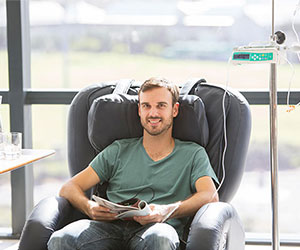Cytotoxic Therapy
A treatment approach that kills cancer cells by using anticancer preparations, including but not limited to chemotherapy and the use of botanical agents.

WHAT IS CYTOTOXIC THERAPY?
Cytotoxic therapies are treatment approaches that can kill cancer cells or slow their growth. In general, cancer is a condition of abnormal cell growth, where abnormal cells replicate unchecked until they form a cancer cell mass known as a tumor. The immune system is unable to cope against the cancer cell onslaught so they are not easily killed without intervention.
Cytotoxic therapy is often used in treatment plans. The therapy may be chosen as a means to prevent cancer cells from spreading, shrink an existing tumor before surgery or radiation as well as remove any remaining traces of cancer cells after surgery both locally and throughout the body. Cytotoxic therapy may also be used as an alternative to traditional chemotherapy since the associated adverse effects are minimized as much as possible.
SIDE EFFECTS OF CYTOTOXIC THERAPY
Traditional chemotherapy uses anticancer drugs to destroy rapidly dividing cancer cells throughout the whole body. However, challenges associated with traditional chemotherapy are that they have difficulty distinguishing between the rapidly dividing cancer cells and healthy cell activity. For that reason, traditional chemotherapy may cause adverse effects while they are fighting cancer.
Patients undergoing traditional chemotherapy may experience one or more of the following adverse effects:
- Nausea, vomiting and diarrhea
- Appetite or weight changes
- Hair loss
- Decreased immune system capacity resulting in increased risk of viral or bacterial illnesses
- Fatigue
- Nerve injury resulting in numbness and tingling in hands and feet
The adverse effects vary depending on the type of chemotherapy drug used, the dosage, if different chemotherapy drugs are used in combination, the location of the cancer and the general health of the patient. As chemotherapy targets rapidly dividing cells, it negatively impacts on three important healthy active cell groups: 1) epithelial (line the surface of the body i.e. skin, intestine, blood vessels); 2) bone marrow (produces red blood cells that carry oxygen, white blood cells that fight infection and platelets that stop bleeding); and 3) nerve tissue (responsible for carrying information to and from the brain). When we consider the function of these active cell groups it explains why individuals, undergoing traditional chemotherapy may experience the aforementioned adverse effects.
CYTOTOXIC THERAPY AT ESPERANCE
At Esperance, oncologists use sensitivity tests to create personalized treatment approach to care. The sensitivity test will generate a laboratory report that informs the practitioner and patient which cytotoxic therapy may soften the adverse effects while still maintaining cancer fighting effectiveness. The treatment plan may include the following types of cytotoxic therapies:
Low-dose chemotherapy
Cancer cell replication can be fought by administering low doses of chemotherapy drugs rather than using the traditional higher doses that cause damage. In combination with low-dose chemotherapy insulin may also be administered. Cancer cells are voracious for sugar and insulin is a key that opens the cells to allow sugar molecules to enter. When insulin is administered with the low-dose chemotherapy the treatment mimics sugar passing into the cells thereby tricking the cancer cells into taking in the low-dose chemotherapy. In short, the insulin creates an unpleasant environment for cancer cells and increases chemotherapy drug uptake by cancer cells.

Metronomic therapy
The treatment concept of metronomic chemotherapy is to apply low doses of chemotherapy drugs scheduled either continuously or at regular intervals over a long period of time. This method alters the immune system to more aggressively attacks cancer cells and restricts replication. Furthermore, patients are able to tolerate an equal or greater amount of chemotherapy without the harsh adverse effects of traditional high doses.

Biological Substances
Biological therapy is a form of cancer treatment that uses botanical agents killing cancer cells directly in addition to restricting replication.